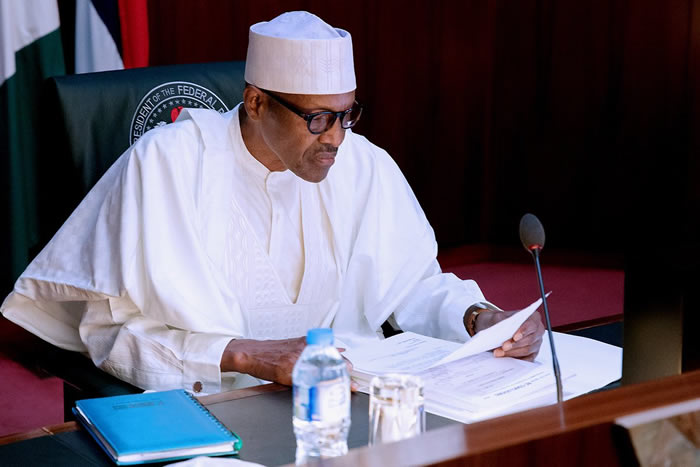Hot Stories
Recent Stories
Revealed! Senate Set To Override Buhari's Veto On Two Bills
Posted by Samuel on Thu 11th Apr, 2019 - tori.ngThe Nigerian senate is reportedly set to override President Muhammadu Buhari's veto on two bills.

President Buhari
According to a report by Punch Metro, the Senate on Wednesday resolved to override President Muhammadu Buhari’s veto on his rejection of a constitutional amendment bill.
The bill seeks to make it mandatory for the President and governor of a state to lay the annual budget estimates before parliament, three months to the end of a financial year.
The red chamber at plenary, also said it would override the President’s veto on the Industrial Development (Income Tax Relief) Amendment Bill.
It also said it would reconsider and pass the Petroleum Industry Governance Bill, Stamp Duties (Amendment) Bill and nine other bills earlier rejected by the President, and transmit them to him for assent.
The upper chamber equally resolved to withdraw four other bills rejected by the President and discontinue further legislative works on them.
The resolution followed the adoption of the report of the Technical Committee on Declined Assent to Bills by the President.
The Chairman of the committee, David Umaru, told his colleagues that his panel scrutinised the 17 bills.
He recommended that 11 of them should be reconsidered and passed by the National Assembly.
He also recommended that four others should be withdrawn even as he called on the National Assembly to override the President’s veto on two bills.
The two bills to be overridden are, the Constitution of the Federal Republic of Nigeria, 1999 (Fourth Alteration, No. 28) Bill, 2018 as well as the Industrial Development (Income Tax Relief) Amendment Bill.
The President had in 2018 declined assent to the Constitution (Fourth Alteration, No. 28) Bill on the grounds that Section 2 (b) and 3 (b) of the proposal ‘appear not to take full cognisance of the provisions of Section 58 (4) of the 1999 constitution.’
But in a 34-page report, the panel submitted that the bill was not in conflict with the 1999 constitution, as claimed by the President.
The panel explained that the purpose of the bill was to ensure that Nigeria reverts to the January to December budget cycle.
The report read, “It should be understood that this bill seeks to make it mandatory for Mr President and governor of a state to cause to be prepared and laid before parliament, estimates of the revenues and expenditure of the federation for the next following financial year, not later than ninety (90) days to the end of a financial year; and for the parliament to pass the Appropriation Bill before the commencement of the next financial year.
“The legislative intent behind this bill is to ensure that we run a normal financial year. From the wordings of the provisions, there was no stipulation that Mr President must assent to any bill within a specified period.
“Therefore, the provision of section 58(4), which Mr President made reference to, does not apply in this regard. On the whole, we respectfully submit that the bill is not in conflict with the provision of section 58(4) of the Constitution as implied by Mr President.
“It is therefore, our concerted view that the Senate should override Mr President’s veto.”
The committee also rejected the President’s decision to decline assent to the Industrial Development (Income Tax Relief) Amendment Bill.
According to the committee chairman, the President’s rejection of the bill on the grounds that there are ongoing consultations to propose a new bill, does not hold water.
“Nothing stops Mr President or anybody for that matter from proposing an amendment to an existing law or even a repeal of an existing law.
“There is nowhere in the world where the President can propose to stop the law-making process by an executive fiat or order. The President cannot withhold assent to a bill on the mere fact that consultations are on-going, which will enable him come up with a new bill.
“Accordingly, it is the committee’s view that the Senate and indeed the National Assembly should override the veto,” the report added.
The bills to be reconsidered, passed and transmitted to the President’s assent include Constitution (Fourth Alteration, numbers 8, 15, 20, 22 and 24 as well as Stamp Duties (Amendment) Bill, Petroleum Industry Governance Bill (PIGB) and National Institute of Hospitality and Tourism (Est.) Bill.
The rest are the National Research and Innovation Council (Est.) Bill, National Agricultural Seeds Council Bill and Agricultural Credit Guarantee Scheme Fund (Amendment) Bill.
Section 58 (5) of the 1999 Constitution provides that two-third of both legislative chambers of the National Assembly (73 senators and 240 members of House of Representatives) are required to override the President’s veto.
Speaking after the committee’s report was adopted, Saraki said the Senate would try to garner the required numbers to enable them override the President’s veto.
“I think we have to find a date where if it is possible to muster the attendance for that,” he said.
Top Stories
Popular Stories
Stories from this Category
Recent Stories






















































